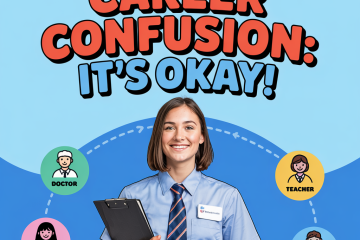“What Can I Do With a Major In…?” – Deep Dive Series (Psychology Example)

Psychology is a popular major, exploring the fascinating complexities of the human mind and behavior. But a common question arises: “What can I actually do with a psychology degree?” Many people immediately think “therapist,” but the careers with psychology degree options are incredibly diverse. Understanding human behavior is valuable in almost any field. Let’s explore some common and some unexpected psychology jobs. Explore diverse career paths with a psychology degree at Cirkled In.
So You’re Interested in Psychology… Now What?
Choosing a major is just the first step. Psychology teaches valuable skills applicable to many roles. While becoming a licensed psychologist or therapist often requires graduate school (Master’s or Doctorate), a bachelor’s degree in psychology provides a strong foundation for various entry-level positions and further specialization. Knowing what to do with psych major starts with understanding the skills you gain.
Understanding Psychology Skills (They’re Super Useful!)
A psychology education helps you develop highly transferable skills, great for your psychology skills resume:
- Analytical & Critical Thinking: Evaluating information, understanding research methods, identifying patterns.
- Communication (Written & Oral): Writing research papers, presenting findings, listening actively, understanding non-verbal cues.
- Problem Solving: Identifying issues, understanding motivations, developing potential solutions.
- Interpersonal Skills: Empathy, understanding perspectives, working with diverse groups.
- Research Skills: Designing studies, collecting and analyzing data, interpreting results.
- Ethical Awareness: Understanding ethical considerations in research and practice.
Clinical & Counseling Paths (The Obvious, But Important Ones)
These roles typically require graduate degrees (Master’s or PhD/PsyD) and state licensure:
- Clinical Psychologist: Diagnoses and treats mental, emotional, and behavioral disorders.
- Counseling Psychologist: Helps people cope with life challenges, improve well-being.
- School Psychologist: Works in schools to support students’ learning and mental health.
- Licensed Clinical Social Worker (LCSW): Provides therapy and connects clients with resources (requires MSW).
- Marriage and Family Therapist (MFT): Specializes in relationship counseling.
These are important non-therapist psychology careers alternatives, but still require advanced training.
Beyond Therapy: Unexpected Psychology Jobs
Many fields value psychology skills, even if the job title doesn’t say “psychologist”:
- Human Resources (HR) Specialist/Manager: Understanding employee motivation, group dynamics, interviewing, training, conflict resolution.
- Market Researcher: Designing surveys, conducting focus groups, analyzing consumer behavior and preferences.
- User Experience (UX) Researcher: Studying how people interact with websites, apps, or products to improve usability and design.
- Probation/Correctional Treatment Specialist: Working within the justice system, understanding behavior and rehabilitation.
- Non-Profit Program Manager: Understanding community needs, designing programs, evaluating impact.
- Public Health Specialist: Working on health behavior change campaigns or community health initiatives.
Leveraging Your Psych Degree in Business & Marketing
Understanding why people buy things or react to messages is crucial in business:
- Marketing Coordinator/Manager: Applying principles of persuasion and consumer psychology to advertising and campaigns.
- Sales Representative: Understanding customer needs and motivations, building rapport.
- Public Relations Specialist: Managing perception and communication.
- Management Trainee Programs: Many companies value the analytical and interpersonal skills from a psych background for leadership tracks.
Psychology in Tech: UX Research and More
The tech industry needs people who understand users:
- UX Researcher: (Mentioned above) A growing field using psychology research methods to improve tech products.
- Content Designer/Strategist: Understanding how users read and process information online.
- AI/Machine Learning (with focus on human behavior): Some roles involve understanding how people interact with AI systems.
Education and Research Pathways
- Researcher/Research Assistant: Working in university labs, government agencies, or private companies conducting studies (often requires graduate degree for higher levels).
- Teacher (K-12): Psychology knowledge is helpful for classroom management and understanding student development (requires teaching certification).
- College Admissions Counselor/Academic Advisor: Understanding student motivations and challenges.
Combining Psychology with Other Interests
Your psychology degree can be combined with other fields:
- Psychology + Law: Law school (understanding juries, witnesses, negotiation).
- Psychology + Business: MBA programs.
- Psychology + Art/Music: Art therapy, music therapy (requires specific grad programs).
- Psychology + Computer Science: Human-Computer Interaction, AI development.
Final Thought: A Psych Degree Opens Many Doors
A psychology degree provides a versatile foundation. While clinical roles require graduate school, the skills you gain open doors to a wide psychology jobs list across business, tech, research, education, healthcare, and non-profits. Think broadly about what to do with psych major, focus on developing transferable skills, gain relevant experience through internships, and you’ll find many rewarding careers with psychology degree options available. Discover your potential with a psychology degree; explore opportunities at Cirkled In.
Need more tips on college applications, scholarships, or just how to survive this whole process? Cirkled In has your back—check out Cirkled In resources to help you through every step of your college journey!



2 Comments
Susan · November 26, 2025 at 10:51 pm
Good
Amy S · December 8, 2025 at 11:47 am
Glad you found it helpful, Susan! 😊 Psychology opens more doors than you’d think—stay curious!